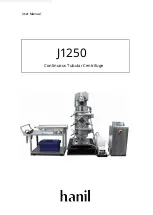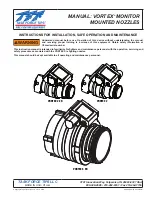
NOT013281-8
CAUTION
Under certain conditions, the minimum V
T
cannot be delivered:
•
When the delivered pressure reaches the Pmax value
•
When certain parameter settings are reached (Low Ti, Low PS and High V
T
).
Expiratory phase
When the cycle is entirely spontaneous (the device does not switch to volume-controlled mode),
cycling to expiration occurs in the same way as in pressure support mode (see page 25).
When the ventilator switches to volume-controlled mode, delivering a constant flow in order to
reach the minimum tidal volume within the time allowed (Ti Max), cycling occurs:
•
When the inspired tidal volume (V
TI
) reaches the set minimum tidal volume
•
At the end of the maximum inspiratory time Ti Max
•
If the pressure in the circuit reaches the Pmax safety threshold and the inspiratory flow is
maintained at a constant level, causing a peak in pressure.
Continuous Positive Airway Pressure (CPAP)
WARNING
CPAP mode is intended to be used when there is constant monitoring by health care
personnel, in emergency situations, or during rehabilitation.
Do not use this mode without supervision for ventilation-dependent patients requiring
continuous ventilation in an ICU, especially paediatric ICU patients.
This mode provides ventilation at one level only, with the inspiratory pressure within 1 cm H
2
O
of the expiratory pressure. On the Elisée 350 it is equivalent to a PS mode, but has only two
adjustable parameters:
The ventilator compensates for the drop in pressure caused by inspiration with an increase in
flow. When the patient exhales, a counter-pressure is applied to the expiratory valve, making it
possible to maintain the expiratory pressure at the CPAP level set by the user.
Adjustable parameters (PS.V
T
)
V
T
Leak
Ti Max
PS
PEEP
Rise time
Inspiratory pressure and flow triggers
Expiratory trigger
Apnea parameters (Tapnea, F, Ti and V
T
or Pi)
FiO
2
Adjustable parameters
Continuous pressure (CPAP)
FiO
2
Summary of Contents for Elisee 350
Page 1: ...Elis e 350 Clinical Manual English Making quality of care easy Respiratory Care solutions...
Page 2: ...Making quality of care easy Respiratory Care solutions...
Page 4: ......
Page 6: ...iv...
Page 10: ...4 102 NOT013281 8...
Page 20: ...14 102 NOT013281 8...
Page 50: ...44 102 NOT013281 8...
Page 86: ...80 102 NOT013281 8...
Page 109: ...Making quality of care easy Respiratory Care solutions...
















































